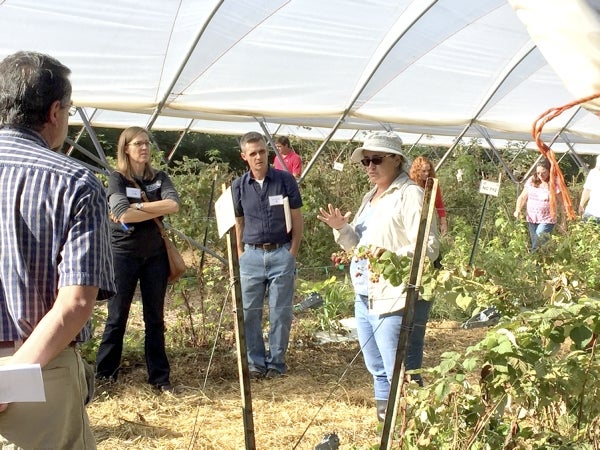Q&A: Get rid of pesticides, take a brewery tour
Published 12:00 am Friday, September 23, 2016

- Cooperative Extension Last year's NC Farm School Summit. This year's summit will be Oct. 11 at Guilford County Cooperative Extension.
By Amy-Lynn Albertson
Cooperative Extension Director
What’s going on this fall?
Question: My granddaddy passed away and we are cleaning out his barn. We found a lot of old pesticide cans and bottles. Some of the containers still have pesticides in them. What should I do with them?
Answer: Rowan County Environmental Management, Cooperative Extension and North Carolina Department of Agriculture and Consumer Sciences will host a Community Special Waste Disposal Day on Oct. 12. Acceptable items include: pesticides, herbicides, fertilizers, solvents, thinners, corrosives, cleaners, pool chemicals, liquid paints, varnishes, aerosol cans, batteries (rechargeable or automotive), propane-helium fire extinguisher and oxygen tanks, electronics (anything with a plug), fluorescent bulbs, TVs, computers, car tires (limit 5/household, no rims), eyeglasses, hearing aids, toner cartridges and appliances.
Chemical products must be in the original containers with the original label. The maximum amount of dry material that may be dropped off is 200 pounds and/or 10 gallons of liquid with no container larger than 5 gallons.
The Rowan County Sheriff’s Office will be on-site to collect outdated prescription and nonprescription medications.
Items NOT accepted are lab reagents, explosives, radioactive materials and asbestos. Unknown or unidentified items will not be accepted. This event is for household quantities only — businesses must contract privately for proper disposal of special waste materials.
This is a project sponsored by the Rowan County Department of Environmental Management in affiliation with the Rowan County Sheriff’s Office, NCDA and Cooperative Extension Services. For further information call the Rowan County Recycling Processing Center at 704-216-8589.
Question: I have a few acres of land and I’m interested in starting a farm, but I don’t know where to begin.
Answer: The North Carolina Farm School Summit is just the conference for you. The NCFS Summit is Oct. 11 from 8:30 a.m.-4 p.m. at the Guilford County Extension Center in Greensboro. The summit is open to anyone interested in starting a farm or already growing a farm. This year we have some excellent speakers and break-out sessions. Our keynote speaker is Alex Hitt, owner of Peregrine Farm. Alex and his wife Betsy have been farming in Alamance County for 35 years. They farm full time, growing vegetables and cut flowers on 4 acres of land. Peregrine Farm sells their products at the Carrboro Farmers Market and Weaver Street Market, several restaurants in the Durham, Chapel Hill area and through their CSA. Alex is passionate about growing new farmers and giving small farms a voice. You can learn more about Alex and Peregrine Farm at www.peregrinefarm.net.
The horticulture breakout sessions will have experts on growing fruit trees, small fruits and cut flowers. The regulation breakout will have sessions on Good Agricultural Practices and Food Safety, Organic Certification, Animal Welfare Approved and other labeling programs, and value added products for your fruit or vegetable operation.
In the livestock breakout sessions Dr. Miguel Castillo will talk on rotational grazing and pasture management. We will also have speakers on marketing your meat or livestock animal, as well as small ruminant health.
One of my favorite parts of the Summit is the panel of N.C. Farm School graduates who will speak about their farm experience and where their businesses are headed. There will be vendors at the summit too, with all your farming needs. Registration is $25/person, and forms are available at www.ncfarmschool.com. The summit is a great way to meet other new and beginning farmers and learn about different farm business endeavors.
Question: How do I save seeds from my vegetable garden?
Answer: It’s important to know if the seeds you are trying to save are from an open pollinated variety of plants or hybrids. Only seed from open pollinated plants will be true to type. The packet that the original seeds arrived in will tell you whether the variety is open-pollinated or hybrid. Watermelon and muskmelon seeds are some of the easiest to save. Cut the muskmelons open, scoop the seeds into a strainer, rinse, and set out to dry. Watermelons are almost as easy. Put the seeds in a strainer and add a dash of dishwashing liquid to remove any sugar left on the seeds. Rinse and dry.
If you want to learn more about saving seeds come to the Seed Saving class on Friday, Sept. 30 from 9-11 a.m. George Place, Catawba County Extension Director and horticulturalist, will teach you how to save your own seed. As an added bonus, varieties of heirloom tomatoes and flower seeds will be given to participants to take home. This workshop is free. Please call 704-216-8970 to register.
Question: Are you going to have the Poinsettia Tour this year?
Answer: No, this year our fall tour will be on Breweries, Barley and Research. The tour is on Oct. 18 from 9 a.m.-3:30 p.m. We will visit the Piedmont Research Station and learn about the different varieties of barley being tested for viability and profitability in North Carolina. While at the station, Aaron Goss of the Carolina Malt House will speak to the group about the business and what that means to the microbrew industry in the Piedmont. Lunch will be at Morgan Ridge Rail Walk Brewery & Eatery, where we will tour the brewery and participants can do tastings, too. The final stop will be New Sarum Brewery, where farmers who use the by-product of beer making will showcase their products and give a tour of brewery.
The cost for the tour is $25 for Rowan County Chamber members and $35/non-members. This price includes lunch, tour and transportation, beer is not included. Go to www.rowanextension.com for more information and tour registration forms.




